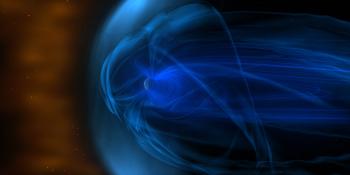Viewing archive of Monday, 8 April 2024
Daily bulletin on solar and geomagnetic activity from the SIDC
Issued: 2024 Apr 08 1231 UTC
SIDC Forecast
Solar flares
C-class flares expected, (probability >=50%)
Geomagnetism
Quiet (A<20 and K<4)
Solar protons
Quiet
| 10cm flux | Ap | |
|---|---|---|
| 08 Apr 2024 | 127 | 011 |
| 09 Apr 2024 | 129 | 010 |
| 10 Apr 2024 | 131 | 003 |
Solar Active Regions and flaring
Solar flaring activity over the last 24h has been low, with four C-class flares. The largest was a C1.4 flare, peaking at 03:15 UTC on April 8th. There are currently six active regions on the solar disk with NOAA AR 3633 (beta-gamma) being the most complex. The solar flaring activity is expected to be at low levels over the next 24 hours, with C-class flares probable.
Coronal mass ejections
Several filaments have erupted in the north-east quadrant in the early UTC morning on April 8th. A related coronal mass ejection (CME) was observed in the LASCO/C2 coronagraph imagery around 04:00 UTC. Current analysis suggests no Earth-directed component. No other Earth-directed CMEs were detected in the available coronagraph observations in the last 24 hours.
Solar wind
The Earth is inside the slow solar wind, with speed values ranging from 426 km/s to 357 km/s and an interplanetary magnetic field around 6nT. The minimum Bz value was -6nT. Around 09:00 UTC, a change in the magnetic field orientation was observed (from negative to positive), possibly related to the influence of the small positive polarity coronal hole which crossed the central meridian on April 5th. Mostly slow solar wind conditions are expected over the next 24h.
Geomagnetism
Geomagnetic conditions were globally and locally at quiet or unsettled levels (NOAA_Kp and K_BEL 0 to 3). Similar conditions are expected in the next 24 hours.
Proton flux levels
The greater than 10 MeV proton flux was below the threshold level over the past 24 hours and is expected to remain so for the next 24 hours.
Electron fluxes at geostationary orbit
The greater than 2 MeV electron flux, as measured by the GOES-16 satellite, was below the threshold level in the last 24 hours. The greater than 2 MeV electron flux measured by the GOES-18 satellite has reached the threshold between 17:50 UTC and 23:30 UTC on April 7th. The 24h electron fluence is presently at normal level and is expected to remain so in the coming 24 hours.
Today's estimated international sunspot number (ISN): 078, based on 19 stations.
Solar indices for 07 Apr 2024
| Wolf number Catania | /// |
| 10cm solar flux | 125 |
| AK Chambon La Forêt | 016 |
| AK Wingst | /// |
| Estimated Ap | 008 |
| Estimated international sunspot number | 085 - Based on 20 stations |
Noticeable events summary
| Day | Begin | Max | End | Loc | Strength | OP | 10cm | Catania/NOAA | Radio burst types | |
|---|---|---|---|---|---|---|---|---|---|---|
| None | ||||||||||
Provided by the Solar Influences Data analysis Center© - SIDC - Processed by SpaceWeatherLive
All times in UTC
Latest news
Latest forum messages
Support SpaceWeatherLive.com!
A lot of people come to SpaceWeatherLive to follow the Sun's activity or if there is aurora to be seen, but with more traffic comes higher server costs. Consider a donation if you enjoy SpaceWeatherLive so we can keep the website online!

Space weather facts
| Last X-flare | 2025/05/14 | X2.7 |
| Last M-flare | 2025/05/15 | M2.1 |
| Last geomagnetic storm | 2025/05/17 | Kp6+ (G2) |
| Spotless days | |
|---|---|
| Last spotless day | 2022/06/08 |
| Monthly mean Sunspot Number | |
|---|---|
| April 2025 | 140.6 +6.4 |
| May 2025 | 68.9 -71.7 |
| Last 30 days | 92.7 -23.7 |


